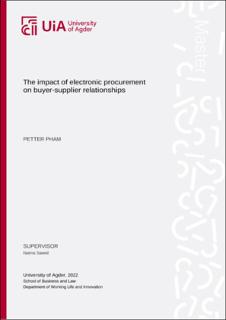| dc.description.abstract | Increased globalisation and global sourcing over the past 30 years have made the Internet and
information technology (IT) along with the procurement role within companies more and
more important. Electronic procurement (e-procurement) and various e-procurement
applications have therefore become important both for procurement and communication
between buyers and suppliers. While the use of the Internet and IT in the interaction between
buyers and suppliers have increased, face-to-face communication between buyers and
suppliers has decreased. It is therefore assumed that buyer-supplier relationships may be
impacted by using e-procurement. The purpose of this thesis is therefore to investigate how eprocurement impacts buyer-supplier relationships and add to the literature regarding the
impact of e-procurement on buyer-supplier relationships. Thus, the main problem statement
of this thesis is:
How does e-procurement impact buyer-supplier relationships?
The research starts with a deductive approach, conducting a literature study. Furtherly,
research questions are developed to help answer the main problem statement and fill
knowledge gaps revealed by the literature. The following research questions are developed:
RQ1) How does e-procurement enhance buyer-supplier relationships? RQ2) How does eprocurement impact the balance of power in buyer-supplier relationships? RQ3) How does
information sharing through IT impact trust in buyer-supplier relationships? Qualitative
interviews are then conducted to find possible answers to the research questions and to
elaborate on the research gaps. The research then proceeds inductively by drawing
conclusions based on an analysis of the interview data. To increase validity, the findings from
the interview data were furtherly compared to the literature study. In addition, the findings
that are most relevant to the research questions are also critically assessed by adding
counterarguments. It can therefore be argued that the research is finalised with a deductive
approach, by testing its findings against the literature.
It is found that e-procurement can be used to build stronger buyer-supplier relationships by speeding up raw data transmission and by sharing information with suppliers based on knowledge gathered using e-procurement. In addition, e-procurement enables the development of a strong buyer-supplier relationship by freeing up resources which may be used for supplier development and cost reduction. By providing the buyer access to information and knowledge, it was furtherly found that e-procurement may increase the power of the buying company by increasing competence to make the right decisions. In addition, it was found that e-procurement can increase the power of the buyer through e-auctions. This is because e-auctions increase supply availability and can reveal current market prices (Smart & Harrison, 2003). Moreover, the findings show how information sharing using IT, in some cases, may not have any impact on trust while it in other cases can improve or even reduce trust. The reason why information sharing using IT may not impact trust is that it is mostly faceless. This is also why only communicating with suppliers using IT may decrease trust, along with reducing information richness sometimes. Information sharing using IT may also decrease trust if the e-procurement system that a supplier uses to share information is not well designed. If the tool functions well, the buyer’s trust in the supplier may increase, however. Furthermore, it is found that sharing information with the supplier using IT, based on knowledge gathered through e-procurement may also improve the supplier’s trust in the buyer as it indicates “good faith” from the buyer’s side (Eckerd & Hill, 2012). If the supplier’s trust toward the buyer is high, the supplier may share valuable information that the buyer didn’t know about (Li & Lin, 2006), which improves the buyer’s trust in the supplier. | |
